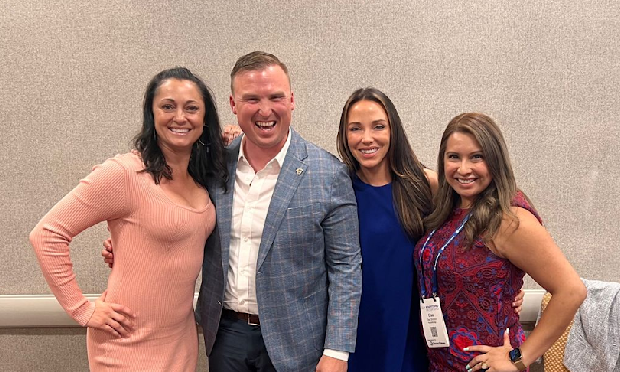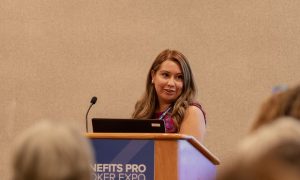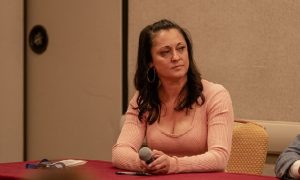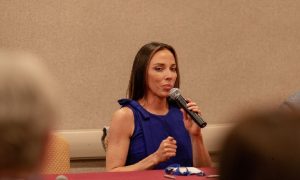 These panelists followed vastly different career progressions to make their marks in the benefits industry. How can we attract more people like them? (Photo: Susan Combs)
These panelists followed vastly different career progressions to make their marks in the benefits industry. How can we attract more people like them? (Photo: Susan Combs)
Anyone who has been in the industry for any length of time knows that "benefits broker" is not a career you dream about from a young age. But few who find their way into the business go on to regret the decision.
At the recent BenefitsPRO Broker Expo in Atlanta, four panelists shared the what, how and why of their unique paths into the benefits industry. There was Elsa Glorioso, former nurse and current vice president of insurance services at PeopleStrategy; Colleen Blum, a cosmetologist before she found her tribe at Combs & Company; Crystal Lewis, educator-turned-regional practice leader at Guardian Life; and Patrick Moore, who jumped into the benefits industry at AXIM Fringe Solutions after a 20-year stint as in the Marine Corp.
 Patrick Moore served more than 20 years in the Marine Corp before finding his place in the benefits industry.
Patrick Moore served more than 20 years in the Marine Corp before finding his place in the benefits industry. Recommended For You
"It's a big deal, the transition from military to civilian," Moore said. "I equate it to X Games athletes; you're doing something that's not relatable to anything else. You leave a team environment where you are taught to sacrifice for the greater good, move into corporate America and it's a dog-eat-dog world. Your instinct to not take credit, to help your team, could backfire."
(Editor's note: We'd also like to give a nod to Hire Our Heros, one of several nonprofit programs working with the Department of Defense to help veterans transition into careers in the civilian workforce that Moore wishes more small business owners — such as benefits agencies — knew more about.)
 Elsa Glorioso was an oncology nurse before entering the world of employee benefits.
Elsa Glorioso was an oncology nurse before entering the world of employee benefits. While there are some aspects of transitioning from military to civilian life that take adjusting, the mindset, determination and resilience Moore gained during his years of service made him ideally suited for the benefits space. It's the essence of a key characteristic he shares with his co-panelists: drive.
"Although we came from different backgrounds, all of our purposes were to make an impact," Glorioso said.
This led to perhaps the most telling moment of the session. A member of the audience asked, "How are you hiring? Where are you finding these people?"
Oh boy. The answers came pouring in, not just from panelists but from other attendees, and a key theme emerged: If you're not attracting the talent you want — people with drive, passion and hunger — take a look at yourself.
"The way we're interviewing has to change," Lewis said. "We had all the same questions we would ask: Where you went to school, what's your favorite hobby? But how do we find someone who has that hunger? What's your backstory, what's your family like, what makes you tick? Once you start to know that person on a human basis, you get a feel for that hunger, that drive."
 Crystal Lewis was happy with her career as an educator, until a divorce forced her to rethink her future plans.
Crystal Lewis was happy with her career as an educator, until a divorce forced her to rethink her future plans. Finding the hunger is only one side of the coin; the other is convincing the candidate that you have what it takes to satiate them. "Don't talk about what you guys do but why you're doing it," Moore said. "It has to be the why factor. If you can communicate what that is for you, it can help you grow that industry."
"You can't just talk it, you have to walk it," Blum agreed. If you have the right story to tell, you should be able to walk into a bar, restaurant or any hospitality establishment and make a sale. "Approach them with a 'here's what we're doing' and tell them what it's all about. Everybody comes on your side when you have the backing, the power, your own voice and conviction."
What's more, making the leap from one career to the benefits industry — or any major career change — is not for the faint of heart.
 Colleen Blum went from styling hair to selling insurance, but it wasn't until she met Susan Combs that her career path really became clear.
Colleen Blum went from styling hair to selling insurance, but it wasn't until she met Susan Combs that her career path really became clear. "I went from a really nice house to renting a bedroom to get my to get myself into a position where I could make the next step," says Lewis, whose transition into the benefits world was not an elective choice on her part so much as a necessity following a divorce. She continued teaching and shooting weddings on the weekends to make ends meet. "When you talk about your drive and your why, it's a temporary sacrifice."
Lewis could have chosen a number of career options, and her first foray into benefits was a struggle. "Coming from the education side, I jumped in over my head," she said. "I really needed a mentor."
Lewis credits Jon Payne, voluntary benefits director at Lockton for coaching her through the rough patches. "[He] talked me through a lot of that, saying, 'Taking the skills that you have, how can you think outside the box?' Using my skills in a different way and being creative to influence an adult is where I really started to see and incite change."
Similarly, Blum found her champion in Susan Combs. Glorioso drew strength from a leukemia patient she worked with during her time as an oncology nurse who offered her a pathway into the banking industry. Not only did they see potential and reach out a hand, but they continued to offer support throughout the career journey.
"If somebody is new coming into this line of business, if they don't feel that you're going to be the person to mentor them to the next level, they're not going to want to work for you," Glorioso said. "We need to adapt to that and hire to that. It's my job to mentor you or find somebody to mentor you and provide you the necessary tools to be successful in this business."
© Touchpoint Markets, All Rights Reserved. Request academic re-use from www.copyright.com. All other uses, submit a request to [email protected]. For more inforrmation visit Asset & Logo Licensing.







